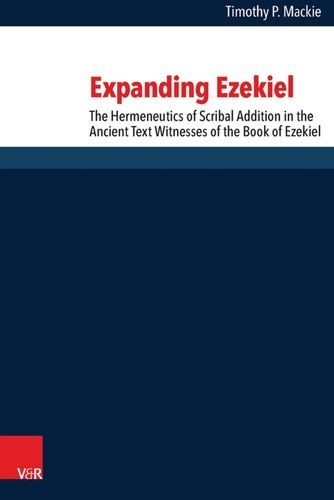- Ebook

Expanding Ezekiel
- Año de edición 2015
Timothy P. Mackie focuses on the quantitative differences between the Greek and Hebrew text witnesses of the book of Ezekiel and explores the interrelationships between the production, transmission, and interpretation of scriptural scrolls by Jewish scribes during the late Second Temple period. A comparison of the Hebrew Masoretic text and Greek Septuagint versions of Ezekiel provides a large body of evidence for the phenomenon of "scribal expansion," instances where scribes added words and phrases into the body of the text.Mackie starts off by laying out a methodology for identifying scribal additionsamong the many textual differences between the Hebrew and Greek text-forms of Ezekiel. Having compiled an index of such quantitative differences, he proposes a descriptive typology for categorizing and analyzing the different types of additions in order to understand their purpose and significance. The body of the book is a commentary on all the various types of scribal expansion.The scribal additions in Ezekiel show how scribes expressed reverence for the text's divine authority, by not only by preserving the sacred text, but supplementing it in order to increase its coherence and clarity for future readers. They also demonstrate an awareness of an emerging collection of scriptural scrolls in the post-exilic Judean community and represent attempts to coordinate Ezekiel with other parts of that collection.Ultimately, the scribal expansions in Ezekiel provide a glimpse into the intersection of scriptural interpretation, scribal production, and the transmission of these texts. Mackie's Conclusions are relevant not only for text-critical scholarship on the Hebrew Bible, but also for research on the early history of Jewish scriptural exegesis and scribal culture.
-
FormatoEbook
-
EstadoNuevo
-
Isbn9783647540337
-
Peso2.2 MB
-
Número de páginas339
-
Año de edición2015
-
IdiomaInglés
-
FormatoPDF
-
ProtecciónDRM
-
ReferenciaBKW129903
